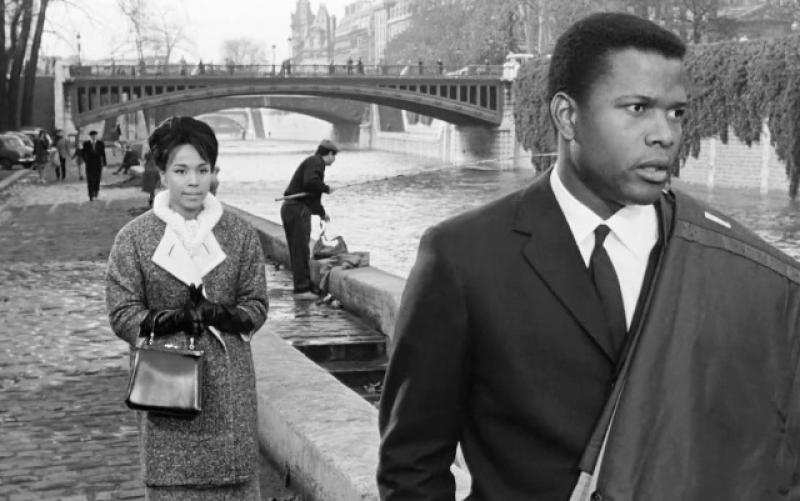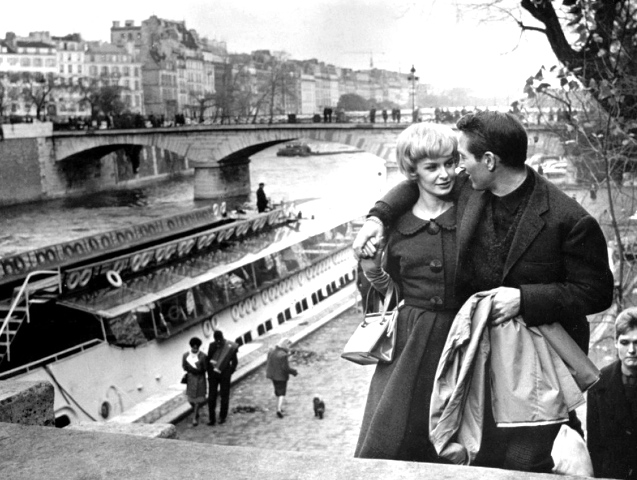DVD/Blu-ray: Paris Blues | reviews, news & interviews
DVD/Blu-ray: Paris Blues
DVD/Blu-ray: Paris Blues
Low-on-pep Duke Ellington-scored curio rates highly for its jazz content and analysis of American racism

The original 1961 poster for Paris Blues trumpeted it as “a love-spectacular so personally exciting you feel it’s happening to you”. Would it were actually thus. Instead, it’s ponderous and features a cast so obviously “acting” that any verve implied by being filmed in Paris and set in the world of jazz is missing in action. Paris Blues is worth seeing, but don’t expect the pulse to quicken.
Ram Bowen (Paul Newman) and Eddie Cook (Sidney Poitier) are American jazzers living in Paris with a residency in a smoky basement. One member of their band is a drug addict and a local Juliette Gréco type is on the scene. Lillian Corning (Joanne Woodward: Newman’s real-life wife, pictured below right with Newman) and Connie Lampson (Diahann Carroll) are American friends vacationing in Paris for two weeks who immediately encounter the musicians, turn their heads and, as unlikely it seems, soon have them seriously contemplating new and settled lives back in their home country. Also arriving in town is trumpeter Wild Man Moore (Louis Armstrong) – Ram wants him to play a tune he’s composed.
 Three elements define the film: the music, the setting and its head-on approach to American racism. With a score by Duke Ellington (Oscar-nominated in 1962) and Armstrong’s appearance, Paris Blues is a jazz-on-film landmark (but not as much as Lift to the Scaffold). Newman and Poitier (obviously) mime atrociously, and the players heard include Armstrong and Ellington as well as Johnny Hodges, Max Roach, Clark Terry and more. For this aspect alone, Paris Blues is highly diggable.
Three elements define the film: the music, the setting and its head-on approach to American racism. With a score by Duke Ellington (Oscar-nominated in 1962) and Armstrong’s appearance, Paris Blues is a jazz-on-film landmark (but not as much as Lift to the Scaffold). Newman and Poitier (obviously) mime atrociously, and the players heard include Armstrong and Ellington as well as Johnny Hodges, Max Roach, Clark Terry and more. For this aspect alone, Paris Blues is highly diggable.
However, despite being a wonderful picture-postcard snapshot of early Sixties Paris, the musical milieu is depicted clunkily with a far-too discernible staging. Everything – whether players on stage or their audience – comes over as forced. As do the interactions between the leads which are, in the main, turgid and over-talky. Despite discussions about racism and the differences between French and American attitudes, there is little spark in the dialogue. Both Newman and Poitier are over-measured, while a miscast Woodward is mumsy (even in her ooh-la-la underwear) and Carroll has little character. There is also a sense the film came too late. Paris really buzzed with American jazzers around a decade earlier. Director Martin Ritt’s work in theatre and television drama inform this too-earnest, too-mannered and not-at-all-edgy film.
The dual format DVD/Blu-ray package of this misfire is splendid, as is the High Definition image restoration. The booklet contains essays on the film’s jazz aspect and new supplements include a reverential, observation-centred commentary, a stills gallery and an isolated music track.
rating
Share this article
The future of Arts Journalism
You can stop theartsdesk.com closing!
We urgently need financing to survive. Our fundraising drive has thus far raised £49,000 but we need to reach £100,000 or we will be forced to close. Please contribute here: https://gofund.me/c3f6033d
And if you can forward this information to anyone who might assist, we’d be grateful.

Subscribe to theartsdesk.com
Thank you for continuing to read our work on theartsdesk.com. For unlimited access to every article in its entirety, including our archive of more than 15,000 pieces, we're asking for £5 per month or £40 per year. We feel it's a very good deal, and hope you do too.
To take a subscription now simply click here.
And if you're looking for that extra gift for a friend or family member, why not treat them to a theartsdesk.com gift subscription?
more Film
 Honey Don’t! review - film noir in the bright sun
A Coen brother with a blood-simple gumshoe caper
Honey Don’t! review - film noir in the bright sun
A Coen brother with a blood-simple gumshoe caper
 The Courageous review - Ophélia Kolb excels as a single mother on the edge
Jasmin Gordon's directorial debut features strong performances but leaves too much unexplained
The Courageous review - Ophélia Kolb excels as a single mother on the edge
Jasmin Gordon's directorial debut features strong performances but leaves too much unexplained
 Blu-ray: The Graduate
Post #MeToo, can Mike Nichols' second feature still lay claim to Classic Film status?
Blu-ray: The Graduate
Post #MeToo, can Mike Nichols' second feature still lay claim to Classic Film status?
 Little Trouble Girls review - masterful debut breathes new life into a girl's sexual awakening
Urska Dukic's study of a confused Catholic teenager is exquisitely realised
Little Trouble Girls review - masterful debut breathes new life into a girl's sexual awakening
Urska Dukic's study of a confused Catholic teenager is exquisitely realised
 Young Mothers review - the Dardennes explore teenage motherhood in compelling drama
Life after birth: five young mothers in Liège struggle to provide for their babies
Young Mothers review - the Dardennes explore teenage motherhood in compelling drama
Life after birth: five young mothers in Liège struggle to provide for their babies
 Blu-ray: Finis Terrae
Bleak but compelling semi-documentary, filmed on location in Brittany
Blu-ray: Finis Terrae
Bleak but compelling semi-documentary, filmed on location in Brittany
 Oslo Stories Trilogy: Sex review - sexual identity slips, hurts and heals
A quietly visionary series concludes with two chimney sweeps' awkward sexual liberation
Oslo Stories Trilogy: Sex review - sexual identity slips, hurts and heals
A quietly visionary series concludes with two chimney sweeps' awkward sexual liberation
 Sorry, Baby review - the healing power of friendship in the aftermath of sexual assault
Eva Victor writes, directs and stars in their endearing debut feature
Sorry, Baby review - the healing power of friendship in the aftermath of sexual assault
Eva Victor writes, directs and stars in their endearing debut feature
 Blu-ray: Who Wants to Kill Jessie?
Fast-paced and visually inventive Czech comedy
Blu-ray: Who Wants to Kill Jessie?
Fast-paced and visually inventive Czech comedy
 Oslo Stories Trilogy: Love review - freed love
Gay cruising offers straight female lessons in a heady ode to urban connection
Oslo Stories Trilogy: Love review - freed love
Gay cruising offers straight female lessons in a heady ode to urban connection
 Beating Hearts review - kiss kiss, slam slam
Romance and clobberings in a so-so French melodrama
Beating Hearts review - kiss kiss, slam slam
Romance and clobberings in a so-so French melodrama

Add comment